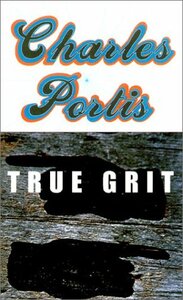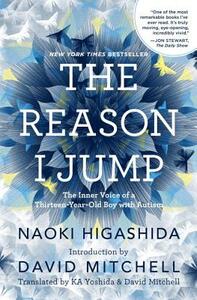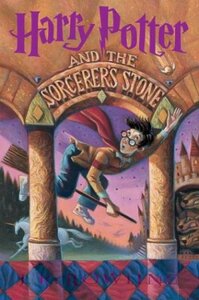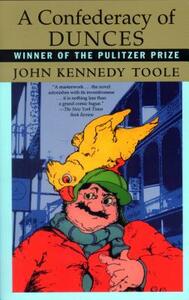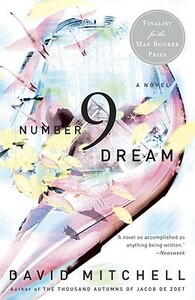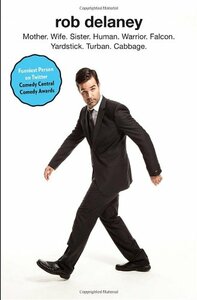You need to sign in or sign up before continuing.
Take a photo of a barcode or cover
matthewcpeck's Reviews (587)
I just had to read this novel because it pops up again and again in interviews with writers I admire, who rhapsodize about its perfect prose. In terms of style and period detail and the lack of anything even mildly extraneous, 'True Grit' IS rather perfect - as unflappable and purpose-driven as its teenage heroine.
That heroine, Mattie Ross, is one of the greatest of narrators. At times I had to stop reading and remind myself that this was a fiction written by a guy in his thirties in the hippie era, and not a middle-aged woman writing her memoirs a hundred years back. The word choices, the deadpan, contraction-free dialogue, the way any slangy term is awkwardly inserted in quotation marks - it all reads just like a yellowed, forgotten document you'd find among a great-grandparent's belongings. But Charles Portis infuses the characters and dialogue with a subtly modern wit and commentary.
In spite of its brevity and rollicking pace, I'll admit I wasn't continually blown away throughout the first two thirds or so, when 'True Grit' is just a very good comic Western. But the ending is something else, going from unbearable intensity to an elegy for old America to breaking your heart...in the space of 15 pages. Without a drop of gooey sentiment, this book earns its name.
That heroine, Mattie Ross, is one of the greatest of narrators. At times I had to stop reading and remind myself that this was a fiction written by a guy in his thirties in the hippie era, and not a middle-aged woman writing her memoirs a hundred years back. The word choices, the deadpan, contraction-free dialogue, the way any slangy term is awkwardly inserted in quotation marks - it all reads just like a yellowed, forgotten document you'd find among a great-grandparent's belongings. But Charles Portis infuses the characters and dialogue with a subtly modern wit and commentary.
In spite of its brevity and rollicking pace, I'll admit I wasn't continually blown away throughout the first two thirds or so, when 'True Grit' is just a very good comic Western. But the ending is something else, going from unbearable intensity to an elegy for old America to breaking your heart...in the space of 15 pages. Without a drop of gooey sentiment, this book earns its name.
'Shaman' is a Cro-Magnon coming-of-age story, about an adolescent named Loon in what is now the area of the celebrated Chauvet-Pont D'arc cave in Southern France. Loon's adoptive father is also his tribe's shaman, and the book begins interestingly and suddenly with our protagonist being stripped and left alone to fend for himself in the midwinter wilderness as part of a 'wander', a walkabout-like ritual required of all apprentice shamans. Within the first few pages, Loon attempts to build a fire, and the excruciating detail that follows is a good indicator of what you can expect from much of Kim Stanley Robinson's novel - it's both admirable and annoying. The first half of the book is more concerned about building a world and imagining a distant way of life, one which Robinson clearly admires. Absorbing storytelling is brushed aside in favor of manual-like descriptions of mixing paint and weaving baskets. Now I love all of 'Moby Dick', even its chapter dedicated to rope, but 'Shaman' doesn't quite have the scope or the vision to justify this sort of thing. And though I support the decision to humanize these characters by putting somewhat modern dialogue into their mouths, having Upper Paleolithic people shout "Mama Mia!' on multiple occasions is a little TOO casual.
Loon's new wife is kidnapped by a northern tribe in the second half of the book, and the story gets much more interesting and harrowing. These sections and and the mesmerizing final section make the book somewhat worthwhile for anyone with an interest in our ancestors - but you still have to suffer through three entire pages discussing showshoe straps. I couldn't believe my eyes.
'Shaman' has adventure, earthy sex, and tragedy, but you have to slog through a lot of information to get there.
Loon's new wife is kidnapped by a northern tribe in the second half of the book, and the story gets much more interesting and harrowing. These sections and and the mesmerizing final section make the book somewhat worthwhile for anyone with an interest in our ancestors - but you still have to suffer through three entire pages discussing showshoe straps. I couldn't believe my eyes.
'Shaman' has adventure, earthy sex, and tragedy, but you have to slog through a lot of information to get there.
When I was twenty years old, I left the region of my rustic childhood home to live in a tiny apartment in the big city, scraping by on menial work and searching for meaning in my existence, while others my age were going to college. By and by, I found the love of my life. So maybe I didn't have the tragic history of Eiji Miyake - hero and narrator of David Mitchell's second novel - but thematic elements were eerily familiar.
Eiji is also obsessed with the music of John Lennon. To employ his kind of analogy, 'Number9Dream' is to 'Revolver' as 'Cloud Atlas' is to 'Sgt. Pepper'. It's not as mind-boggingly ambitious as its follow-up, but it's as innovative and agile in its own fashion. Each of the eight chapters in Eiji's quest to find his biological father in Tokyo has its own distinct shape and style, allowing Mitchell's formidable storytelling skills to flourish. You've got your ultra-violent yakuza, love hotel debauchery, a 'Phantom Tollbooth'-like children's book-within-a-book, WWII journals, and more.
My few nitpicks: some too-neat plotting and an excess of cutesy sardonic dialogue from even the most minor characters. Also the problems of writing English dialogue for a foreign setting without sounding too stilted or too Western, but that's tough to avoid.
With that out of the way, 'Number9Dream' is a lovely, hilarious, gross, psychedelic, romantic story of Japan with one of my favorite narrators in some time. Murakami's masterpiece 'Wind-Up Bird Chronicle' gets a brief shout-out, and fans of that book will find a lot to adore here.
Eiji is also obsessed with the music of John Lennon. To employ his kind of analogy, 'Number9Dream' is to 'Revolver' as 'Cloud Atlas' is to 'Sgt. Pepper'. It's not as mind-boggingly ambitious as its follow-up, but it's as innovative and agile in its own fashion. Each of the eight chapters in Eiji's quest to find his biological father in Tokyo has its own distinct shape and style, allowing Mitchell's formidable storytelling skills to flourish. You've got your ultra-violent yakuza, love hotel debauchery, a 'Phantom Tollbooth'-like children's book-within-a-book, WWII journals, and more.
My few nitpicks: some too-neat plotting and an excess of cutesy sardonic dialogue from even the most minor characters. Also the problems of writing English dialogue for a foreign setting without sounding too stilted or too Western, but that's tough to avoid.
With that out of the way, 'Number9Dream' is a lovely, hilarious, gross, psychedelic, romantic story of Japan with one of my favorite narrators in some time. Murakami's masterpiece 'Wind-Up Bird Chronicle' gets a brief shout-out, and fans of that book will find a lot to adore here.
This is the third of William's story collections that I've read, and it's my favorite. As in the career arc of Cormac McCarthy, her move to the American Southwest seems to have opened up new channels of imagination. Her earlier collections were all about fractured families and alienated young women. The protagonists still run along those lines in 'Honored Guest', but it's death that's creeping in every tale here, overtly or covertly. Williams reminds the reader of how fragile and absurd human existence is over the course of these 12 perfect stories, which never, ever head in the expected direction, in terms of both plot and characterization. In 'Congress' a forensic anthropologist takes up hunting and fashions a lamp out of four deer legs; his wife becomes enthralled by this lamp and attributes to it animate, conscious qualities; after the husband suffers profound brain damage from falling asleep in a deer stand and driving his own arrow through his brain, they embark on a road trip to a taxidermy museum with a cultishly adored proprietor, who spontaneously names the wife as his successor...you know, that tired old story.
Other favorites: the haunting, sad title story, the blackly comic 'Charity', 'Visiting Priveleges'. These stories are both carefully controlled and crazy, and, as any Joy Williams fan will tell you: addictive. Take the advice of those fans and the many writers that esteem her so highly, and read 'Honored Guest' or 'The Quick And The Dead', already. You can meet children like this:
"I think of God as a magician," ZoeBella whispered, looking closely at Janice. "A rich magician who has a great many sheep who he hypnotizes so he won't have to pay for shepherds or fences to keep them from running away. The sheep know that eventually the magician wants to kill them because he wants their flesh and skin. So first the magician hypnotizes them into thinking that they're immortal and that no harm is being done to them when they get skinned, that on the contrary it will be very good for them and even pleasant. Then he hypnotizes them into thinking that the magician is their good master who loves them. Then he hypnotizes them into thinking that they're not sheep at all. And after all this, they never run away but quietly wait until the magician requires their flesh and their skin."
Other favorites: the haunting, sad title story, the blackly comic 'Charity', 'Visiting Priveleges'. These stories are both carefully controlled and crazy, and, as any Joy Williams fan will tell you: addictive. Take the advice of those fans and the many writers that esteem her so highly, and read 'Honored Guest' or 'The Quick And The Dead', already. You can meet children like this:
"I think of God as a magician," ZoeBella whispered, looking closely at Janice. "A rich magician who has a great many sheep who he hypnotizes so he won't have to pay for shepherds or fences to keep them from running away. The sheep know that eventually the magician wants to kill them because he wants their flesh and skin. So first the magician hypnotizes them into thinking that they're immortal and that no harm is being done to them when they get skinned, that on the contrary it will be very good for them and even pleasant. Then he hypnotizes them into thinking that the magician is their good master who loves them. Then he hypnotizes them into thinking that they're not sheep at all. And after all this, they never run away but quietly wait until the magician requires their flesh and their skin."
Let me just get the matter of the Fiona Apple-esque title out of the way. It's derived from a very good Rob Delaney tweet, but it's a very bad name for one's first book. I just finished reading it, yet if you asked me its name? I'd be stumped. That's got to be undesirable from a marketing point-of-view.
Anyway, the contents of the book are better. Delaney is a standup comic, but his career has been built on the brilliant, shockingly funny one-liners of his Twitter account. The feed is deservedly popular and rivaled only by that of Megan Amram, who happens to be writing a book of her own. Readers that are only familiar with his tweets may be surprised by long-form Delaney, which, like his stand-up act, is anecdotal, scatological, candid, and eloquent. He's an uplifting version of Louis CK. 'Mother' runs through the high- and lowlights of Delaney's, from his childhood and adolescence in Marblehead, MA to his ugly struggles with alcoholism and depression to the beginning of his comedy career and the birth of his son. Also - like Sarah Silverman - he had a persistent bed wetting problem. (Obviously there is some kind of profound link between the psychological effects of peeing the bed and a future as an excellent comedian?)
Though there's plenty of silliness, the bulk of the book is devoted to Delaney's alcoholism, which culminated in a nasty car crash and rehab. These chapters go to surprisingly dark, harrowing places, as much so as any 'serious' memoir on a similar subject. But the stories are shot through with wit, and instructions on how to masturbate with two broken arms.
Rob Delaney wouldn't be so funny if he wasn't also so smart and sensitive. This was a fine read. Whatever its name is.
Anyway, the contents of the book are better. Delaney is a standup comic, but his career has been built on the brilliant, shockingly funny one-liners of his Twitter account. The feed is deservedly popular and rivaled only by that of Megan Amram, who happens to be writing a book of her own. Readers that are only familiar with his tweets may be surprised by long-form Delaney, which, like his stand-up act, is anecdotal, scatological, candid, and eloquent. He's an uplifting version of Louis CK. 'Mother' runs through the high- and lowlights of Delaney's, from his childhood and adolescence in Marblehead, MA to his ugly struggles with alcoholism and depression to the beginning of his comedy career and the birth of his son. Also - like Sarah Silverman - he had a persistent bed wetting problem. (Obviously there is some kind of profound link between the psychological effects of peeing the bed and a future as an excellent comedian?)
Though there's plenty of silliness, the bulk of the book is devoted to Delaney's alcoholism, which culminated in a nasty car crash and rehab. These chapters go to surprisingly dark, harrowing places, as much so as any 'serious' memoir on a similar subject. But the stories are shot through with wit, and instructions on how to masturbate with two broken arms.
Rob Delaney wouldn't be so funny if he wasn't also so smart and sensitive. This was a fine read. Whatever its name is.
Despite what the subtitle may promise,'Visit Sunny Chernobyl' isn't REALLY an checklist of the most objectively toxic places on earth. In addition to the infamous 'zone' of the title site, journalist Andrew Blackwell visited six other locales over a number of years and collected the memoirs in this book. Some of them - like soy farms in the Amazon - aren't really 'polluted' as much as environmentally/socially unsound. But this is not a science book, it's an offbeat travel book by a likable, hilarious, self-deprecating guy (with relationship problems). It's not meant to be a harangue about the horrors that humans have wreaked upon nature, but a realistic examination of how people live with and adapt to an increasingly polluted world. Even when Blackwell loses focus of that central thesis and rambles off on digressions, he's a clever, humanist tour guide that never fails to entertain.
I've been a David Foster Wallace for thirteen years, and somehow I still haven't got around to reading his first story collection, 'Girl With Curious Hair', or his final one, 'Oblivion', even while I've read 'Infinite Jest' TWICE. It's the same phenomenon that keeps me from renting Stanley Kubrick's debut feature or listening to Elliott Smith's debut album: I've so fully absorbed the artist's latter, perfected work that I just know the early stuff will be sketchy and disappointing in comparison.
But 'Girl' is quite good. Fans of DFW's later stuff will find more of the the distinctive voice they know and love in these stories than in his earlier novel 'The Broom Of The System'. The stories & novella herein serve as a fascinating transition between the wacky showiness of 'Broom' and the emotionally wrenching 'Infinite Jest', where he mastered the technique of reaching your heart via your intellect.
'Girl' finds DFW experimenting with dialects and voices, notably in two of my favorite selections: the very, very funny title story narrated in the clinical tones of a young conservative attending a Keith Jarrett show with a group of aimless punks, and 'John Billy', a densely told Oklahoma tall tale that sounds like the Coens after they've downed a cocktail of peyote and cocaine. Other standouts (for me) are 'Lyndon', an uncharacteristic but beautifully wrought piece that imagines the LBJ presidency through the eyes of a gay aide, and 'Luckily The Account Representative Knew CPR', which showcases DFW's astounding ability to stretch a small span of time and wring out every sensation and detail. I wasn't as blown away by the first story 'Little Expressionless Animals' (icy, cerebral story about a 'Jeopardy' champion), and 'Here And There' (beware of any short story dedicated to a mathematician).
Finally there is the 140-page 'Westward The Course Of Empire Takes Its Way', which might as well have existed as a separate book (Just Google John Barth's 'Lost In The Funhouse' first). I found it a lot more enjoyable than internet reviewers and DFW himself deemed it to be. Sure it's collegiate, messy, pretentious, but it's also imaginative and hilarious, its ostensible story of former McDonald's child-commercial-stars in a never-ending car ride through Illinois cornfields as weird and addicting as anything in 'Infinite Jest'. Wallace had intended the story as a sort of bomb thrown in the face of postmodern fiction, but he was ultimately embarrassed by it later on. Lucky for him and us, he did exactly what he set out to do with his subsequent work.
But 'Girl' is quite good. Fans of DFW's later stuff will find more of the the distinctive voice they know and love in these stories than in his earlier novel 'The Broom Of The System'. The stories & novella herein serve as a fascinating transition between the wacky showiness of 'Broom' and the emotionally wrenching 'Infinite Jest', where he mastered the technique of reaching your heart via your intellect.
'Girl' finds DFW experimenting with dialects and voices, notably in two of my favorite selections: the very, very funny title story narrated in the clinical tones of a young conservative attending a Keith Jarrett show with a group of aimless punks, and 'John Billy', a densely told Oklahoma tall tale that sounds like the Coens after they've downed a cocktail of peyote and cocaine. Other standouts (for me) are 'Lyndon', an uncharacteristic but beautifully wrought piece that imagines the LBJ presidency through the eyes of a gay aide, and 'Luckily The Account Representative Knew CPR', which showcases DFW's astounding ability to stretch a small span of time and wring out every sensation and detail. I wasn't as blown away by the first story 'Little Expressionless Animals' (icy, cerebral story about a 'Jeopardy' champion), and 'Here And There' (beware of any short story dedicated to a mathematician).
Finally there is the 140-page 'Westward The Course Of Empire Takes Its Way', which might as well have existed as a separate book (Just Google John Barth's 'Lost In The Funhouse' first). I found it a lot more enjoyable than internet reviewers and DFW himself deemed it to be. Sure it's collegiate, messy, pretentious, but it's also imaginative and hilarious, its ostensible story of former McDonald's child-commercial-stars in a never-ending car ride through Illinois cornfields as weird and addicting as anything in 'Infinite Jest'. Wallace had intended the story as a sort of bomb thrown in the face of postmodern fiction, but he was ultimately embarrassed by it later on. Lucky for him and us, he did exactly what he set out to do with his subsequent work.
